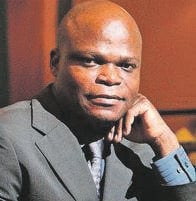
Professor Mulalo Doyoyo, an accomplished innovator and Ivy League-educated engineer, was ready to establish a firm that would produce brick-making machines – but his plans came to naught.
Doyoyo intended to produce 100 black entrepreneurs in townships to end the mainstream white companies’ dominance in the brick-making industry. He was allegedly turned down on the grounds that he had to compete for his original idea with the Chinese.
At a meeting with the Industrial Development Corporation (IDC) in 2017, the acclaimed engineer said Mathopane Masha, the director of inclusive economy at Gauteng’s economic development department, told him that “the Chinese are black”. He took this to mean the Chinese would also be considered for the project.
Doyoyo believes it is this kind of attitude that hampers the birth of new black-owned industries or the expansion of existing ones, which would create much-needed jobs in the country. He said it was made worse by financial institutions that wanted the owner to contribute, which most black people could not do because they didn’t have the money.
Doyoyo is an inventor who, among his many innovations, created the cement-less concrete called Cenocell, which is produced in the US and has been patented worldwide. He invented Cenocell while he was based at the Georgia Institute of Technology in the US as an engineering professor. Cenocell cement is made from fly ash – a by-product of coal combustion in coal-fired power plants, cement production, paper manufacturing and mining operations.
Locally, he has invented an ecofriendly paint called Amoriguard, which is made from mining and industry waste.
He studied and lectured in some of the world’s leading institutions, including the Massachusetts Institute of Technology (MIT) – one of eight Ivy League tertiary institutions considered to be the best in the world – for more than 20 years before returning home in 2012.
“I was told that the Chinese are black by officials in the Gauteng economic development department,” Doyoyo said, “and the take-off agreement with the department was not signed.”
Doyoyo’s invention – the Ecocast brick machine – uses less water and energy to produce quality bricks.
He said everything was on track – the IDC had approved R27 million in funding – until the department’s officials had to sign a take-off agreement for the project, which would act as surety that the IDC would get its money back. But the department had signed a memorandum of understanding with Doyoyo’s company, Ecocast.
“The officials at the IDC offices told me that the Chinese can also make machines. I had an investor at the meeting who was ready to put down an owner’s contribution. Instead, he witnessed me being told that the Chinese are black,” Doyoyo said.
The dream to create a large-scale black brick-making industry evaporated at that meeting. Doyoyo was going to assist the entrepreneurs with certification from the SA Bureau of Standards so that they could land sizeable contracts with municipalities and private companies.
“If I go to China today, will they call me Chinese?” Doyoyo asked.
He said the department had initially approached him to help with this project. But he’s now had to close down his Ecocast brick machine plant.
Masha did not respond to written questions sent to him via text and WhatsApp.
Nombulelo Nyathela, the spokesperson for the Gauteng economic development department, denied that there was an agreement between her department and Ecocast, but City Press has seen the memorandum signed by both parties. It is valid from November 1 last year to October 31 this year.
“There was never a formal agreement between the department and Ecocast or any company in the country. The proposed agreement was with one of the agencies [Gauteng Enterprise Propeller] and, upon assessment, it did not find the proposal viable,” Nyathela said.
She said the department supported the project, but the decision regarding funding “lay elsewhere”.
“Masha denies making any reference to a Chinese company or that the Chinese are black,” she said.
City Press has, however, seen the loan agreement signed between the IDC and Doyoyo, which indicates that the plan to get the project off the ground was as good as done.
TECHNOLOGY INNOVATION BLUEPRINT FOR SA
In 2007, Doyoyo produced a document outlining how to establish a resource-driven technology concept centre that would stimulate and support innovation in the country.
The spin-off from this centre, he said, was that it would reduce poverty by creating new firms and strengthening existing ones to create more jobs – the same idea of establishing the plant that manufactures the Ecocast machines.
In his document, Doyoyo envisioned a centre that would bring together innovators, local and international academic institutions and government to create and sustain a vibrant culture of cutting-edge research and innovation.
The centre, Doyoyo said, was going to be like a “miniature MIT”.
“The centre’s emphasis on commercialisation will inspire a culture of productivity in the overall South African innovation system,” he said.
Doyoyo said he came up with the idea for the centre when he was working with engineering students to produce one of his innovations, a hydrogen bike.




 Publications
Publications
 Partners
Partners









